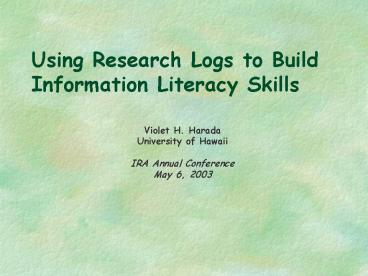Using Research Logs to Build Information Literacy Skills PowerPoint PPT Presentation
Title: Using Research Logs to Build Information Literacy Skills
1
Using Research Logs to Build Information Literacy
Skills
Violet H. Harada University of Hawaii IRA Annual
Conference May 6, 2003
2
Targets
- Inquiry-based research projects.
- Information literacy skills.
- Research logs as a learning tool.
- Teacher and librarian as teaching partners.
3
Inquiry-based projects
- Focus on real-world issues and concerns.
- Deal with larger themes and concepts.
- Embrace big questions that drive the study.
4
Inquiry-based projects
- Involve seeking information from multiple
sources, different points of view. - Require rigorous thinking - synthesis, analysis,
evaluation. - Demand continuous reflection.
5
Inquiry-based projects
- Result in products that communicate findings to
real audiences. - Encourage interaction and cooperative work.
6
Information literacy process
- 1.Explore the broader topic.
- 2.Identify possible focus for study.
- 3.Generate meaningful questions.
- 4.Plan for searching and presentation.
- 5.Locate and retrieve useful information.
7
Information literacy
- 6.Evaluate and organize information.
- 7.Develop and present knowledge gained from
information. - 8.Continually assess how learning is occurring.
8
Research logs
- Reveal thinking and reasoning.
- Demonstrate what students know and dont know.
- Allow for expression of personal feelings.
9
Teacher and librarian
TEACHER Content Students
LIBRARIAN Resources Information literacy
BOTH Teaching strategies Assessment tools
10
Snapshot of practice
- What does project look like?
- How do teachers and librarians collaborate?
- What teaching and learning tools are used?
11
Snapshot of practice
- How do research logs reflect student
understanding of the research process? - How do logs help instructors strengthen their
teaching?
12
Gr. 6 - Mililani Mauka
- Essential questions
- Are ancient civilizations still alive today?
- How have they contributed to our lives?
- Project
- Create a special fair in the library to display
findings. Invite other classes, parents, and
neighboring schools to attend the fair.
13
Phase 1 Explore broader topic
- Culture boxes.
- Library read-in.
- Webbing.
- Research log.
14
Phase 1 Explore broader topic
- Log prompt
- How did I explore the broader topic?
- What are 2 things that I added to the class web?
15
Phase 2 Identify focus
- Checklist to select a focus.
- Research log.
16
Phase 2 Identify focus
- Log prompt
- What is my focus?
- What did I consider in selecting it?
17
Phase 3 Generate meaningful questions
- Stems to generate questions.
18
Phase 4 Plan for search and presentation
- Group planning form.
- Research log.
19
Phase 4 Plan for search and presentation
- Log prompt
- What steps did we take in planning?
20
Phase 5 Locate and retrieve information
- Organizer to identify resources.
- Web site evaluation form.
- Research log.
21
Phase 5 Locate and retrieve information
- Log prompt
- Which resources seem most useful? Why?
22
Phase 6 Organize information
- Note taking organizer.
- Research log.
23
Phase 6 Organize information
- Log prompt
- Could you describe how to take good notes to
someone new to the class?
24
Phase 7 Present and evaluate work
- Rubrics.
- Research log.
25
Phase 7 Present and evaluate work
- Log prompt
- My family is coming to the fair.How could I
explain the steps I took to produce my final
presentation?
26
Results and insights
- Novice searchers can communicate what worked and
did not work. - Students will openly share their feelings IF
trusting relationships are developed.
27
Results and insights
- Research process is complex, involves multiple
skills. - Logs force students to think about how they are
learning.
28
Teaching insights
- Breaking down concepts and skills.
- Debriefing with students.
- Designing learning tools that help organize
thinking. - Incorporating thinkaloud procedures, more
modeling.

